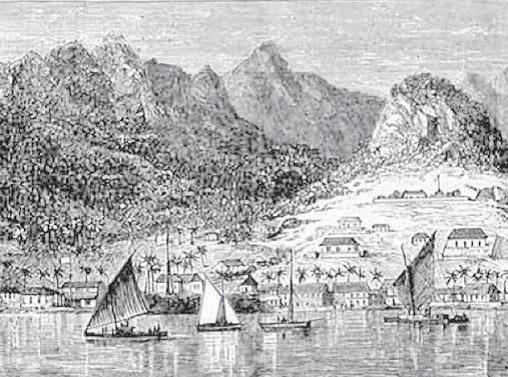History of Bau Part 5
During the period when Bau was developing her aggressiveness well beyond her old dominions, the Tongans were by no means unaware of the growing power of Cakobau and the arrival in Lakeba in 1848 of Ma’afu, a prince of the royal blood of Tonga, led to a development of Tongan power in Lau, which later was to challenge the supremacy of Cakobau.
Indeed in 1850 when Cakobau declared war on the Christian villages in Verata, Tongans came to the help of the missionaries and thus became involved in direct opposition with Bau.
So long as Cakobau stuck to his successful tactics and policy based on custom, his power was virtually absolute.
Indeed, in 1850, the American consul addressed him in a letter as “Tui Viti” a title implying that he was paramount chief over the whole group – a title to which he was certainly not entitled.
His installation in 1853 as Vunivalu in the place of Tanoa, who died in 1852, only regularised an existing situation.
However, his authority crumbled from 1850 to 1855 when he tried to introduce innovations not hallowed by custom.
He ordered from the Americans two gunboats which were delivered in 1851, whereupon the agents pressed for payment and he demanded a levy of beche-de-mer throughout his dominions.
This new tax, though less onerous in implementing than house building or providing food was not backed by tradition and his subjects would not collect the sea slugs, even when he set them an example by fishing with his own hands.
He was thus not able to pay for his gunboats.
Later Qaraniqio, his personal enemy in Rewa, rebuilt his village and started to corrupt the border villagers of Bau.
So successful was he that the mainland from Kaba to Namena was in revolt and Ovalau declared her independence.
In 1853, Levuka was destroyed by the Lovoni people and there was a breach in the co-relationship between Cakobau and the Europeans who considered that Bau was to blame for the fire.
A defeat at Sawakasa added to Cakobau’s discomfort, and his army fled in panic following an abortive attempt to crush Kaba.
Cakobau was in despair, and was persuaded by King George of Tonga to embrace Christianity in return for an offer of help.
The immediate reaction to his move was to stiffen the opposition and the struggle became one not between Bau and Rewa but between Christianity and heathenism.
So bad had the position become that, in 1854, Bau sued for Peace with Rewa. Her overtures were haughtily rejected.
But next year, Bau’s fortunes began to turn.
Qaraniqio died of dysentery and Rewa made peace with Bau.
However, the Bau rebels continued the struggle until King George of Tonga agreed to provide troops to help Cakobau.
Thereupon everyone who hated Christianity or Bau joined the enemy.
The final battle took place in Kaba in 1885, and Bau once more regained he power over her old subjects.
Cakobau’s rejoicing was short-lived because he now found his supremacy challenged by Ma’afu and the Tongans who were ravaging territory claimed by Bau.
Also the Americans were claiming 9000 pounds as compensation for damage allegedly done both at Levuka and at Nukulau where the American Consul’s house had been burned to the ground.
The latter damage was probably caused by pure accident, but the consul, Williams, hated Cakobau and laid his claim for compensation against the Vunivalu.
Cakobau knew that he could not deal effectively with the Americans and with the Tongans and on the advice of Mr Pritchard, the British consul, he offered to cede Fiji to England on the condition that he should retain the rank and title of Tui Viti and that the British Government should satisfy the American claims in return for 900 000 acres of land.
But it was discovered that Cakobau’s authority controlled less than half the group and the British Government already embarrassed by the expenses of the Maori wars, could not at that state entertain the offer of cession on such terms.
From 1860 and 1869, the Europeans increased in number, and the control of political affairs by them checked Ma’afu.
Various unsuccessful attempts were made to establish a government and in 1871, Cakobau was declared sovereign of the entire group, with a ministry and two houses of Parliament.
It should be noted that the Fijians had no votes.
This government did little except get into debt and split the country into factions.
In 1873, the political situation became intolerable and eventually the chiefs of Fiji were induced to cede Fiji unconditionally to Queen Victoria.
The Deed of Cession was signed in 1874 and Sir Arthur Gordon, became the first Governor of Fiji.




